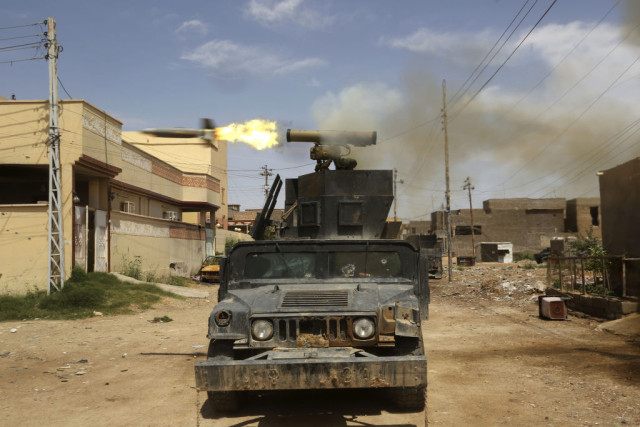HIT, Iraq (AP) — After clearing a street of Islamic State fighters, Maj. Salam Hussein began moving house to house. Rifling through drawers in living rooms and bedrooms, he pulled out a handful of papers, pamphlets and books all printed by the Islamic State group.
“We find this (stuff) is every house,” he said using a profanity. “Look, this is for children, secondary school,” he said holding up an exercise book with a child’s drawing of an IS flag on the front cover.
Maj. Hussein is with Iraq’s Special Operations Forces, the country’s elite counterterrorism troops. His men are leading the fight against IS in the western Iraqi town of Hit along the Euphrates river valley. While Iraqi forces say they’re now in control of most of the town, the operation has been painfully slow going.
Iraqi forces were met with tens of thousands of trapped civilians, making it difficult to call in airstrikes, and fierce resistance from IS fighters. Commanders on the ground say they’ve killed and captured more foreign fighters and the skill of the fighters they have been up against in Hit far outweighs what they saw in the battle for Ramadi earlier this year.
Hit is poised to be the most recent territorial victory for Iraqi forces battling IS under close cover of coalition air support. After overrunning Iraq’s second largest city of Mosul in 2014, Islamic State militants swept across northern and western Iraq, linking the group’s territories in Iraq and Syria and declaring a caliphate. The group still controls large swaths of territory straddling the Syria-Iraq border.
“Hit was a Daesh capital, it was their capital city in Anbar,” said Gen. Abdel Ghani al-Asadi, the head of Iraq’s counterterrorism forces, using the Arabic acronym for IS.
In chatter that Iraqi forces overheard from intercepted IS radio communications, IS fighters were saying that “this is our headquarters and we will never leave this area,” said Gen. al-Asadi. While Ramadi, the provincial capital of Anbar which was retaken by government forces in February, may have been a more symbolically important victory, al-Asadi said that Hit was always considered a higher priority by IS.
Hit sits along a highway that connects IS fighters in Iraq to the group’s forces in Syria and was the last major town west of Ramadi fully under IS control before the Syria border. Consolidating gains there will help pave the way for future operations further north, according to Iraqi and coalition officials.
On Thursday, Iraqi forces on the southern edge of Hit moved down the street of residential blocks, calling for coalition air support before advancing just a few dozen meters at a time. A handful of Humvees provided cover as a bulldozer erected a roadblock from rubble and abandoned vehicles to prevent potential suicide car bombings.
Shops along all the town’s streets were shuttered. Some blocks appear to have been completely leveled by the fighting. The only civilians in the streets were groups of people fleeing, holding white flags and carrying bags of food, blankets and clothing.
“Toward the end, there was nothing here, no doctors for my children or my mother. We just stayed in our houses,” a resident identifying himself as Abu Muhammed said as he fled through the ruined streets with his family. “We just had tea and sugar left in the kitchen at the end.”
On the edge of another main street, an Iraqi officer freed song birds from a pet shop. “If we leave them in the cages they’ll just die,” another officer explained.
Initially Maj. Hussein and other counterterrorism commanders thought the operation to retake Hit would only take a matter of days. Now, the push is entering its seventh week. Hussein said he’s dealt with the long mission by upping his intake of energy drinks; he keeps a full cooler of them in his Humvee and said he now averages more than 20 a day.
Inside another abandoned home along the frontline, Maj. Hussein pulled out handfuls of clothing, long shirts and trousers in central Asian style, the strictly enforced dress code in IS-ruled cities and towns.
“See this, it’s the uniform of Daesh,” he said, pulling out a child-sized garment. “These people wanted to create a whole new generation … that’s why they were focusing on the children.”
___
Associated Press writer Khalid Mohammed in Hit, Iraq contributed to this report.

COMMENTS
Please let us know if you're having issues with commenting.